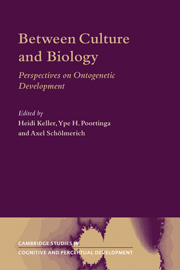Book contents
- Frontmatter
- Contents
- List of figures
- List of tables
- Notes on contributors
- Acknowledgements
- Introduction
- Part I Setting the scene
- Part II Perspectives on development informed by culture
- Part III Perspectives on development drawing from the universal and the specific
- Part IV Perspectives on development informed by evolutionary thinking
- 10 Development as the interface between biology and culture: a conceptualization of early ontogenetic experiences
- 11 Integrating evolution, culture and developmental psychology: explaining caregiver–infant proximity and responsiveness in central Africa and the USA
- 12 Shame across cultures: the evolution, ontogeny and function of a ‘moral emotion’
- Part V Metaperspectives
- Author index
- Subject index
- Cambridge Cultural Social Studies
10 - Development as the interface between biology and culture: a conceptualization of early ontogenetic experiences
Published online by Cambridge University Press: 22 September 2009
- Frontmatter
- Contents
- List of figures
- List of tables
- Notes on contributors
- Acknowledgements
- Introduction
- Part I Setting the scene
- Part II Perspectives on development informed by culture
- Part III Perspectives on development drawing from the universal and the specific
- Part IV Perspectives on development informed by evolutionary thinking
- 10 Development as the interface between biology and culture: a conceptualization of early ontogenetic experiences
- 11 Integrating evolution, culture and developmental psychology: explaining caregiver–infant proximity and responsiveness in central Africa and the USA
- 12 Shame across cultures: the evolution, ontogeny and function of a ‘moral emotion’
- Part V Metaperspectives
- Author index
- Subject index
- Cambridge Cultural Social Studies
Summary
In this chapter it is argued that the analysis of developmental processes allows us to understand the interaction between biological predispositions and environmental information with respect to the initiation of culturally informed developmental pathways. Based on evolutionary theorizing, an organismic metaperspective (Eckensberger and Keller, 1998) is adopted, considering contemporary humans, like any other species, as incorporating evolved behavioural dispositions. The biological heritage and the cultural present are components of the same developmental processes. This view postulates ‘transactional relations’ between organism and environment, rejecting any simplistic biological determinism. Behavioural development is geared at encompassing developmental tasks, which have specific functions during the life histories of individuals. Thus, development is understood as a teleonomic process instead of pursuing overarching teleological goals. It is argued that the early social experiences of infants with their caregivers set the stage for developmental trajectories that lead to ontogenetic adaptation. A component model of parenting is introduced that captures cross-cultural as well as interindividual differentiations.
Biological underpinnings: the evolutionary heritage
Evolutionary approaches differentiate proximate from ultimate causes when describing behavioural adaptations. The analysis of proximate causes mainly concerns the question how interactive dynamics should be understood (Anastasi, 1958), focusing on somatic, social and psychological processes. The ultimate cause of any proximate adaptation is evaluated in terms of its contribution to optimal genetic reproduction (inclusive fitness, Hamilton, 1964). Therefore, the question how has necessarily to be complemented with the question why specifying origin and function of developmental patterns (Eckensberger, 1996; Eckensberger and Keller, 1998; Mayr, 1988).
- Type
- Chapter
- Information
- Between Culture and BiologyPerspectives on Ontogenetic Development, pp. 215 - 240Publisher: Cambridge University PressPrint publication year: 2002
- 44
- Cited by



